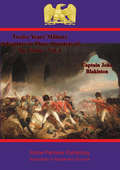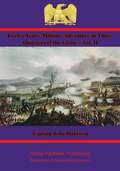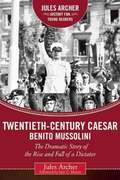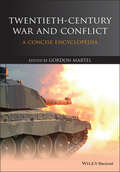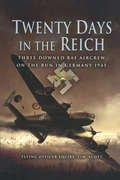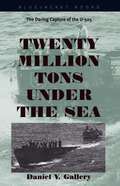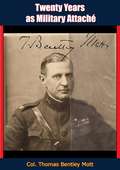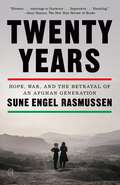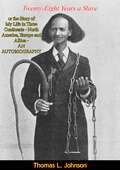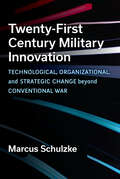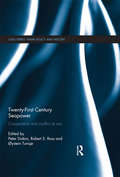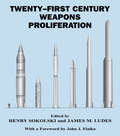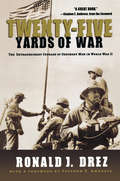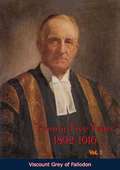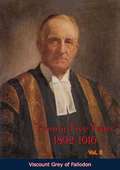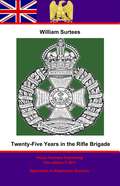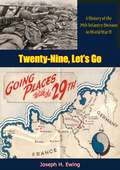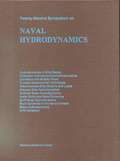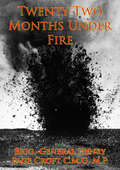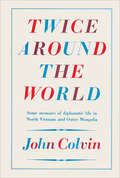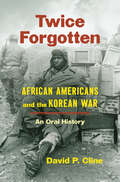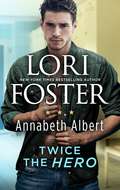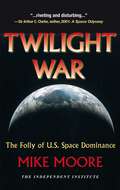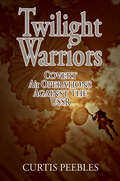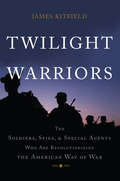- Table View
- List View
Twelve Years’ Military Adventure in Three-Quarters of the Globe – Vol. I (Twelve Years’ Military Adventure in Three-Quarters of the Globe #1)
by Captain John BlakistonThis ebook is purpose built and is proof-read and re-type set from the original to provide an outstanding experience of reflowing text for an ebook reader. Educated from a young age for the military profession of arms, John Blakiston was sent to the Royal Military Academy at Woolwich, becoming an Engineer assigned to East India Company army. Thereafter he transferred into the British army in Europe and then into the Portuguese service fighting in the Peninsula. He wrote his military memoirs in two volumes; each focussing on a period of his service in the military. The first volume concentrated on his time with the East India Company; it is very valuable not only for its own narrative, but also for the rarity of any narrative that describes the initial campaigns of the then Colonel Wellesley in command of a sizeable force and in semi-independent command. At the time of his commission into the East India Company, a new administration in India led by Marquess Richard Wellesley (the future Duke's elder brother) was just installed and was to come into conflict with the armies of not only Tippoo Sultan, ruler of Mysore, but also with numerous bands of rebels. The full title of the book -- Twelve Years' Military Adventure in Three-Quarters of the Globe or Memoirs of an Officer who served in the Armies of his Majesty and of the East India Company between the years 1802 and 1814, in which are contained the Campaigns of the Duke of Wellington in India and his last in Spain and the South of France.-- Vol. I Author -- Captain John Blakiston (???? - ????) Text taken, whole and complete, from the edition published in two volumes 1829, London, by H. Colbourn. Original - ii and 403 pages. Title - Twelve Years' Military Adventure in Three-Quarters of the Globe Sub-Title - or Memoirs of an Officer who served in the Armies of his Majesty...Vol. I Series Name - Twelve Years' Military Adventure in Three-Quarters of the Globe Series Number -- 1
Twelve Years’ Military Adventure in Three-Quarters of the Globe – Vol. II (Twelve Years’ Military Adventure in Three-Quarters of the Globe #2)
by Captain John BlakistonThis ebook is purpose built and is proof-read and re-type set from the original to provide an outstanding experience of reflowing text for an ebook reader. Educated from a young age for the military profession of arms, John Blakiston was sent to the Royal Military Academy at Woolwich, becoming an Engineer assigned to East India Company army. Thereafter he transferred into the British army in Europe and then into the Portuguese service fighting in the Peninsula. He wrote his military memoirs in two volumes; each focussing on a period of his service in the military. The second volume concentrates on the Peninsular War under the Duke of Wellington, after a raid into Dutch [at the time French] Java, and is considered, even amongst the memoirs of the period, to be a somewhat rare account from an engineer officer - and one that fought in the service of Portugal. Battles such as Vittoria, the Nive and the Nivelle are recounted with an admirable eye for detail. The full title of the book is -- Twelve Years' Military Adventure in Three-Quarters of the Globe or Memoirs of an Officer who served in the Armies of his Majesty and of the East India Company between the years 1802 and 1814, in which are contained the Campaigns of the Duke of Wellington in India and his last in Spain and the South of France.-- Vol. II Author -- Captain John Blakiston (???? - ????) Text taken, whole and complete, from the edition published in two volumes 1829, London, by H. Colbourn. Original -198 pages. Title - Twelve Years' Military Adventure in Three-Quarters of the Globe Sub-Title - or Memoirs of an Officer who served in the Armies of his Majesty...Vol. II Series Name - Twelve Years' Military Adventure in Three-Quarters of the Globe Series Number -- 2
Twentieth-Century Caesar: The Dramatic Story of the Rise and Fall of a Dictator (Jules Archer History for Young Readers)
by Jules Archer Iain C. MartinBenito Mussolini was a man of many contradictions but with one driving ambition: to rule Italy and restore it to the power and splendor of the ancient Roman Empire, with himself as the new Caesar. He became the founder of the Fascist movement and dictator of all of Italy.The son of a poor blacksmith who was an ardent Socialist, Mussolini grew up in an atmosphere of political agitation. He taught school for a brief time and then became a fiery journalist, attacking the government with a violence that caused him to be imprisoned eleven times before he was thirty. He was a genuine idealist, but he was also an opportunist. Mussolini used his influence to get Italy into World War I by accepting a bribe from France, thus betraying his cause.Mussolini’s weaknesses were dramatically revealed by the fantastic blunders he committed during the war and by the swift collapse of his Fascist party under pressure. As defeat followed defeat, he was arrested but escaped to northern Italy, where he became head of a puppet government set up by Hitler. When World War II ended, he was executed.
Twentieth-Century War and Conflict: A Concise Encyclopedia
by Gordon MartelDrawn from the award-winning 5-volume Encyclopedia of War, this valuable, one-volume reference provides readers with essential information on the conflicts and concepts that shaped global warfare in the twentieth-century and up to the present day. Provides essential coverage of twentieth-century warfare across the world Incorporates entries on all major wars, conflicts and concepts in the study of warfare during the period Features detailed coverage of the First and Second World Wars, along with conflicts including the Russo-Japanese War, the Greco-Turkish War, the Falklands Conflict, the Soviet Invasion of Afghanistan, the Gulf Wars, the War Against Terrorism, and the Somalian Civil War Covers topics including chemical warfare, ethnic cleansing, psychological warfare, and women and war Creates an affordable and handy personal reference for students of modern and contemporary history, professional scholars, and military history enthusiasts Comprises authoritative, up-to-date content - each entry ranging from 1,000 to 6,000 words - written by the best international scholars
Twenty Days in the Reich: Three Downed RAF Aircrew on the Run in Germany, 1945
by Squire 'Tim' ScottIn this thrilling WWII memoir, a Royal Air Force navigator recounts his time as a POW in Germany just as Allied forces marched toward victory. On March 15th, 1945, three crew members of a Bomber Command Lancaster baled from their crippled aircraft over Germany&’s Rhur Valley. All three were soon captured and handed over to German guards who escorted them over 120 miles to a POW camp. In Twenty Days in the Reich, RAF navigator Squire &“Tim&” Scott recounts his experience behind enemy lines. With Allied forces quickly advancing, the transportation system was in chaos. The small party traveled by one of the few remaining trains and sometimes resorted to hitchhiking. Though the nights were bitterly cold, the two guards were surprisingly sympathetic. Scott was amazed by the civility of the local people, a stark contrast to the horrific tales of how Allied POWs were treated. Before they were rescued by Allied forces, twenty-twp days after baling out, the three had only spent fifteen days as prisoners and only thirty-six hours behind barbed wire.
Twenty Million Tons Under the Sea
by Daniel V. GalleryIn June 1944, U.S. Navy Task Group 22.3, a "hunter-killer" force commanded by Daniel Gallery to track down German submarines, boarded and captured U-505 off the coast of Africa. It was the first time that an enemy ship of war had been captured on the high seas by U.S. Navy sailors since 1815, when the USS Peacock seized HMS Nautilus as part of the War of 1812. The extraordinary feat is described in gripping narrative by Gallery himself, who chronicles the long and arduous battle against the German U-boat under the most hazardous conditions. Once they succeeded in capturing and towing their prize seventeen-hundred miles across the Atlantic Ocean, U-505 proved to be of inestimable value, yielding secrets to radio codes among other things. U-505 is now on exhibit at Chicago's Museum of Science and Industry.
Twenty Years as Military Attaché
by Col. Thomas Bentley MottA memoir written by Colonel T. Bentley Mott, reflecting on his time as a U.S. military attaché, serving in France, among other locales, and relating personal anecdotes about many early 20th century military and political figures, including Admiral Dewey, General Merritt, Czar Nicholas, Theodore Roosevelt, Pershing and others.Mott served the United States in various capacities during the Spanish-American War and World War I.
Twenty Years: Hope, War, and the Betrayal of an Afghan Generation
by Sune Engel RasmussenWinner of the Overseas Press Club of America’s Cornelius Ryan book awardOne of the Washington Post's 50 Best Nonfiction Books of 2024 An Economist Best Book of the Year | An Air Mail editor's pick"Rasmussen combines social history with rigorous reporting . . . His ability to delve into [his characters'] lives lends his book the feeling of a novel . . . Trenchant . . . Superlative." —Martha Anne Toll, The Washington Post"Devastating . . . Impressive . . . Haunting." —Suzy Hansen, The New York Review of BooksAn intimate history of the Afghan war—and the young Afghans whose dreams it enabled and dashed. No country was more deeply affected by 9/11 than Afghanistan: an entire generation grew up amid the upheaval that began that day. Young Afghans knew the promise of freedom, democracy, and safety, fought with each other over its meaning—and then witnessed its collapse. In Twenty Years, the Wall Street Journal correspondent Sune Engel Rasmussen draws on more than a decade of reporting from the country to tell Afghanistan’s story from a new angle. Through the eyes of newly empowered women, skilled entrepreneurs, driven insurgents, and abandoned Western allies, we see the United States and its partners bring new freedoms and wealth, only to preside over the corruption, war-lordism, and social division that led to the Taliban’s return to power. Rasmussen relates this history via two main characters: Zahra, who returns from abroad with high hopes for her liberated county, where she must fight to escape a brutal marriage and rebuild her life; and Omari, who joins the Taliban to protect the honor of his village and country and winds up wrestling with doubt and the trauma of war after achieving victory. We also meet Parasto, who risks her life running clandestine girls’ schools under the new Taliban regime, and Fahim, a rags-to-riches tycoon who is forced to flee. With intimate access to these and other characters, Rasmussen offers deep insight into a country betrayed by the West and Taliban alike.
Twenty-Eight Years a Slave: North America, Europe and Africa - An Autobiography
by Thomas L. JohnsonThomas L. Johnson's remarkable life, wherein he was born into slavery before going on to a successful career as a minister and missionary, is told here in his own words.Until the age of twenty-eight, Johnson lived under the yolk of his slave masters. As a servant he was subject to abuse for trivial matters, such as not knowing the difference between right and left. Sold on by his master whilst still a teenager, the author had already self-taught himself rudiments of literacy from letters and newspapers left around his master's house. Luckily, his new master's son was kind, and helped Johnson with vocabulary and letters. This knowledge helped Johnson keep aware of developments - the abolitionist movement, which sought freedom for all slaves, was of particular interest, as were the politics of Britain, which had already outlawed slavery.Significantly, Thomas also became interested in religion, learning many words, expressions and lessons from the Bible. After emancipation, this knowledge spurred him on to join the priesthood. He travelled to New York, and soon discovered his natural talent for speaking. A black preacher so soon after emancipation was an unusual sight; it wasn't long before Johnson had made friends and began to contemplate further travels to spread God's word. Sure enough, his talents saw him permanently resettle in England, and embark upon travels even farther afield.-Print ed.
Twenty-First Century Military Innovation: Technological, Organizational, and Strategic Change beyond Conventional War
by Marcus SchulzkeContemporary war is as much a quest for decisive technological, organizational, and doctrinal superiority before the fighting starts as it is an effort to destroy enemy militaries during battle. Armed forces that are not actively fighting are instead actively reengineering themselves for success in the next fight and imagining what that next fight may look like. Twenty-First Century Military Innovation outlines the most theoretically important themes in contemporary warfare, especially as these appear in distinctive innovations that signal changes in states’ warfighting capacities and their political goals. Marcus Schulzke examines eight case studies that illustrate the overall direction of military innovation and important underlying themes. He devotes three chapters to new weapons technologies (drones, cyberweapons, and nonlethal weapons), two chapters to changes in the composition of state military forces (private military contractors and special operations forces), and three chapters to strategic and tactical changes (targeted killing, population-centric counterinsurgency, and degradation). Each case study includes an accessible introduction to the topic area, an overview of the ongoing scholarly debates surrounding that topic, and the most important theoretical implications. An engaging overview of the themes that emerge with military innovation, this book will also attract readers interested in particular topic areas.
Twenty-First Century Seapower: Cooperation and Conflict at Sea (Cass Series: Naval Policy and History)
by Robert S. Ross Peter Dutton Øystein TunsjøThis book offers an assessment of the naval policies of emerging naval powers, and the implications for maritime security relations and the global maritime order. Since the end of the Cold War, China, Japan, India and Russia have begun to challenge the status quo with the acquisition of advanced naval capabilities. The emergence of rising naval powers is a cause for concern, as the potential for great power instability is exacerbated by the multiple maritime territorial disputes among new and established naval powers. This work explores the underlying sources of maritime ambition through an analysis of various historical cases of naval expansionism. It analyses both the sources and dynamics of international naval competition, and looks at the ways in which maritime stability and the widespread benefits of international commerce and maritime resource extraction can be sustained through the twenty-first century. This book will be of much interest to students of naval power, Asian security and politics, strategic studies, security studies and IR in general.
Twenty-First Century Weapons Proliferation: Are We Ready?
by Henry Sokolski James M. LudesLeading US security practitioners fromt he Ford, Carter, Reagan, Bush and Clinton administrations, plus other experts on proliferation, clarify the weapons proliferation threats that the US and its allies will face, and suggest what new policies their governments should consider.
Twenty-Five Yards of War: The Extraordinary Courage of Ordinary Men in World War II
by Stephen E. Ambrose Ronald J. DrezFrom the sinking decks of a navy cruiser to the cockpit of a doomed B-25 bomber, Ronald J. Drez takes us to the front lines of World War II. Through Drez's gripping narrative style, we meet twelve men, all ordinary soldiers, and learn what the war was like through their eyes, experiencing their own 'twenty-five yards of war.' The men in these pages represent all branches of the military who were sent on impossible missions, where they witnessed triumphs and tragedies. As a result of Drez's ten years of research and over 1,400 interviews, Twenty-Five Yards of War is a tribute to all of the soldiers who fought in World War II--those who walked away with amazing stories to tell, and those who did not make it home.
Twenty-Five Years: 1892-1916 - Vol. I (Twenty-Five Years: 1892-1916 #1)
by Viscount Grey of FallodonGREAT BRITAIN’S brilliant statesman, Foreign Secretary during the early years of the war, tells the story of the twenty-five years from 1892 to 1916 inclusive—an account of the most momentous period in modern history by the man who was for a longer time continuously in charge of Foreign Affairs than any other minister in the world.Lord Grey enters deeply into British-American relations—revealing for the first time many important transactions hitherto unknown to the public—and has much to say of Theodore Roosevelt, Walter Hines Page and Colonel House, giving us some Roosevelt letters never before published. He also gives the text of the confidential memorandum presented to him by Colonel House which stated the peace terms President Wilson would attempt to secure.The outstanding work of the year, supplementing in many interesting ways “The Life and Letters of Walter H. Page.”Richly illustrated throughout with photographs.
Twenty-Five Years: 1892-1916 - Vol. II (Twenty-Five Years: 1892-1916 #2)
by Viscount Grey of FallodonGREAT BRITAIN’S brilliant statesman, Foreign Secretary during the early years of the war, tells the story of the twenty-five years from 1892 to 1916 inclusive—an account of the most momentous period in modern history by the man who was for a longer time continuously in charge of Foreign Affairs than any other minister in the world.Lord Grey enters deeply into British-American relations—revealing for the first time many important transactions hitherto unknown to the public—and has much to say of Theodore Roosevelt, Walter Hines Page and Colonel House, giving us some Roosevelt letters never before published. He also gives the text of the confidential memorandum presented to him by Colonel House which stated the peace terms President Wilson would attempt to secure.The outstanding work of the year, supplementing in many interesting ways “The Life and Letters of Walter H. Page.”Richly illustrated throughout with photographs.
Twenty-Five years in the Rifle Brigade
by Pickle Partners Publishing Quartermaster William Surtees John SurteesThis ebook is purpose built and is proof-read and re-type set from the original to provide an outstanding experience of reflowing text for an ebook reader. A thoughtful account from the ranks of the Rifle Brigade, by a former enlisted man who raised himself to the rank of quarter-master and served throughout the Peninsular War and the expedition to America which met with a disastrous end at New Orleans. Surtees' account of his service with the famed 95th rifles is littered with vivid descriptions of the battles and actions that he was engaged including, the battles of Barossa (perhaps the best first-hand account of the battle in which the British captured the eagle of the 8th de Ligne) , Vittoria, Orthez and Toulouse. He was also present at the siege of Badajoz and terrible retreat under Sir John Moore. He also casts a thoughtful eye on the lot of the average ranker in the army, and the severe discipline that they served under; having seen the sack of Badajoz and court-martials he recorded that; "An English army is perhaps, generally speaking, under stricter discipline than any other in the world; but in proportion as they are held tight while they are in hand, if circumstances occur to give them liberty, I know of no army more difficult to restrain when once broke loose. " A fine memoir of a hard-campaigning soldier. Text taken, whole and complete, from the 1833 edition, published in London by T Cadell Original - 435 pages. Author - William Surtees (4th August 1781 - 28th May 1830) Foreword - John Surtees (????-????) Linked TOC. - in keeping with the format of the times that the book was published the table of contents includes the summary notes of each chapter
Twenty-Nine, Let’s Go: A History of the 29th Infantry Division in World War II
by Joseph H. EwingThe 29th Infantry was on the front lines on D-Day, Battle of Normandy, and was the first division to cross the Elbe into Germany. When, on January 17, 1946, the 29th Infantry Division was deactivated, 28,776 soldiers had been killed, wounded, taken prisoner or missing.In September 1944, Joseph H. Ewing joined the famed 29th Infantry Division of the Maryland-Virginia National Guard as the unit was readying to storm the port city of Brest, France. In Germany, he led his rifle platoon in making an assault crossing of the Roer River at Julich, which led to the division’s drive on Munchen-Gladbach. During quiet periods on the Roer, Col. Ewing typed and edited a newspaper he titled Chin Strap. The scant-copy newspaper was circulated within the company and also caught the eye of battalion headquarters. The publication earned Col. Ewing the nicknames “Strap” and “The Strap.”At the end of World War II, Col. Ewing was assigned to Fort Meade and the War Department Historical Division in the Pentagon, and decided to author the official history of the 29th Division in World War II.This fascinating account of the division’s wartime history is the result of Col. Ewing’s combat experience and civilian career in journalism.
Twenty-Second Symposium on Naval Hydrodynamics
by National Research CouncilConference held August 9-14, 1998 in Washington, D.C. Organized jointly by the Office of Naval Research, The NRC and the Naval Surface Warfare Center, Carderock Division. Promotes the technical exchange of naval research developments of common interest to all the countries of the world.
Twenty-Two Months Under Fire [Illustrated Edition]
by Brig.-General Henry Page Croft C.M.G. M.P.Includes the First World War Illustrations Pack - 73 battle plans and diagrams and 198 photos"Reminiscences of a TA officer of the 1st Hertfordshire who served 22 months in France as company and battalion commander and finally brigade commander.When war broke out the author, a TA major, was commanding C Company of the 1st Battalion the Hertfordshire Regiment, a TA regiment. In January 1915 he succeeded to command of the battalion and in February 1916 he was appointed commander of the 68th Brigade, a position he held for the next six months, one of the few TA officers to have command of a brigade. So this story is of one who saw active service on the Western Front as a company, battalion and brigade commander in the space of twenty-two months. He was also MP for Christchurch from 1910 to 1918 and Bournemouth from 1918 to 1940 in which year he was created Baron of Bournemouth. The battalion landed in France on 6 November 1914 and a fortnight later joined the 4th Guards Brigade in 2nd Division and stayed with it till the Guards Division was formed in August 1915, when it was transferred to the 6th Brigade, still in 2nd Division. The time spent with the Guards Brigade had rubbed off on the battalion -- the author refers to them as the 'Herts Guards', perhaps with a touch of self-importance. There was plenty of action during this first year described in a series of short chapters, culminating in Croft's last action as a CO, the Battle of Loos; four months later he took over 68th Brigade in 23rd Division and the second part of the book is an account of this command."-Print ed.
Twice Around the World: Some Memoirs of Diplomatic Life in North Vietnam and Outer Mongolia
by John ColvinJohn Colvin's career as one of Her Majesty's Representatives in Foreign Parts never scaled the greatest heights of the ambassadorial ladder, but it did lead to two unusual postings, which he describes in this book. In 1966 he was sent to Hanoi at a time when the Vietnam War began to assume its full rigour, and his verdict on the American involvement, contrary to the widely-held view, is that they did not leave Indo-China without credit or achievement. His next posting was as Ambassador to the People's Republic of Mongolia. His memories of that remote but lovely country, which dwell as much upon topographical as political aspects, provide an insight into life in what was then a Russian satellite state, far removed from the centre of world affairs.
Twice Forgotten: African Americans and the Korean War, an Oral History
by David P. ClineJournalists began to call the Korean War "the Forgotten War" even before it ended. Without a doubt, the most neglected story of this already neglected war is that of African Americans who served just two years after Harry S. Truman ordered the desegregation of the military. Twice Forgotten draws on oral histories of Black Korean War veterans to recover the story of their contributions to the fight, the reality that the military&8239;desegregated in fits and starts, and how veterans' service fits into the long history of the Black freedom struggle. This collection of seventy oral histories, drawn from across the country, features interviews conducted by the author and his colleagues for their American Radio Works documentary, Korea: The Unfinished War, which examines the conflict as experienced by the approximately 600,000 Black men and women who served. It also includes narratives from other sources, including the Library of Congress's visionary Veterans History Project. In their own voices, soldiers and sailors and flyers tell the story of what it meant, how it felt, and what it cost them to fight for the freedom abroad that was too often denied them at home.
Twice the Hero
by Lori Foster Annabeth AlbertTwo classic contemporary male/male romances from authors Lori Foster and Annabeth Albert, now in one collection!What Chris Wants by Lori FosterWhen the going gets tough, the tough turn to Chris Chapey. As the right-hand man to a group of take-no-prisoners mercenaries, Chris can organize a top-secret rescue mission with his eyes closed. But when it comes to his personal life, Chris is the one who needs a little help.His problem: Matt Houser. Chris can’t deny his attraction to Matt, but Matt has no idea what Chris’s job really entails and how much it means to him. Matt challenges Chris to change his life—and make a place for him in it. Can Chris risk telling him the truth?Originally published in 2013Off Base by Annabeth AlbertAfter trading the barracks for a fixer-upper rental, navy SEAL Zack Nelson wants peace, not a roommate—especially not Pike, who sees things about Zack he most wants to hide. Pike’s flirting puts virgin Zack on edge. And the questions Pike’s arrival would spark from Zack’s teammates about his own sexuality? Nope. Not going there. But Zack can’t refuse. Pike Reynolds knows there won’t be a warm welcome in his new home. What can he say? He’s an acquired taste. But he needs this chance to get his life together. Also, teasing the uptight SEAL will be hella fun. Still, Pike has to tread carefully; he’s had his fill of tourists in the past, and he can’t risk his heart on another, not even one as hot, as built—and, okay, yeah, as adorable—as Zack.Originally published in 2017
Twilight War: The Folly of U.S. Space Dominance
by Mike MooreConsidering the historical background of space militarization and providing an overview of the United States' efforts to militarily dominate space since the dawn of the space age, this book argues that America must either ensure that space-related weapons are verifiably banned for all nations through an international treaty or definitively choose a policy of unilateral space dominance that may lead to an arms race in space and possibly to another cold war.The 1967 Outer Space Treaty designated space as the &“province of all mankind.&” It expressly prohibited nuclear and non-nuclear weapons of mass destruction in orbital space and exclusively limited the use of the Moon and other celestial bodies for &“peaceful purposes.&” But changes in the post–Cold War world, as well as unforeseeable advances in satellite and weapons technologies, have compelled every space-faring nation—save the U.S. and Israel—to go on record as favoring a new treaty for the Prevention of an Arms Race in Outer Space. In Twilight War: The Folly of U.S. Space Dominance, Mike Moore, former editor of The Bulletin of the Atomic Scientists, argues that the U.S. merely provokes conflict when it presumes to be the exception to the rule. Rejecting treaty negotiations while further militarizing space renders America unable to lead by example. Moore concludes that instead of trying to stop an arms race in space by starting one, the U.S. must radically rethink its strategy.
Twilight Warriors
by Curtis PeeblesFrom the start of the Cold War to the fall of Saigon, from the Congo to Tibet, from the Bay of Pigs to North Vietnam and Nicaragua, here is a comprehensive overview of U.S. air-supported covert operations against the Soviet bloc. Twilight Warriors brings a sense of continuity to the shifting, shadowy battlefronts of the Cold War, spanning the postwar decades with one fascinating account after another. The known and not-so well known are woven together to provide the big picture: failed early attempts to set up spy cells behind the Iron Curtain (confounded by the agent Kim Philby), the actual CIA plane that secretly appeared in the James Bond film "Thunderball," Operation Mongoose, clandestine "airlines," and the gutsy breed who took to the skies as airborne spies. This is a sweeping, globe-trotting account of covert ops in the post-war era that reads like an epic secret history.
Twilight Warriors: The Soldiers, Spies, and Special Agents Who Are Revolutionizing the American Way of War
by James KitfieldA dramatic portrait of the innovative Special Forces commanders and FBI agents who wage war against America's hidden enemiesWith the planned withdrawal of US troops from Iraq and Afghanistan, the longest conflicts in our nation's history were supposed to end. Yet we remain at war against expanding terrorist movements, and our security forces have had to continually adapt to a nihilistic foe that operates in the shadows.The result of fifteen years of reporting, Twilight Warriors is the untold story of the tight-knit brotherhood that changed the way America fights. James Kitfield reveals how brilliant innovators in the US military, Special Forces, and the intelligence and law enforcement communities forged close operational bonds in the crucibles of Iraq and Afghanistan, breaking down institutional barriers to create a relentless, intelligence-driven style of operations. At the forefront of this profound shift were Stanley McChrystal and his interagency team at Joint Special Operations Command, the pioneers behind a hybrid method of warfighting: find, fix, finish, exploit, and analyze. Other key figures include Michael Flynn, the visionary who redefined the intelligence gathering mission; the FBI's Brian McCauley, who used serial-killer profilers to track suicide bombers in Afghanistan; and the Delta Force commander Scott Miller, responsible for making team players out of the US military's most elite and secretive counterterrorism units.The result of their collaborations is a globe-spanning network that is elegant in its simplicity and terrifying in its lethality. As Kitfield argues, this style of operations represents our best hope for defending the nation in an age of asymmetric warfare. Twilight Warriors is an unprecedented account of the American way of war-and the iconoclasts who have brought it into the twenty-first century.
